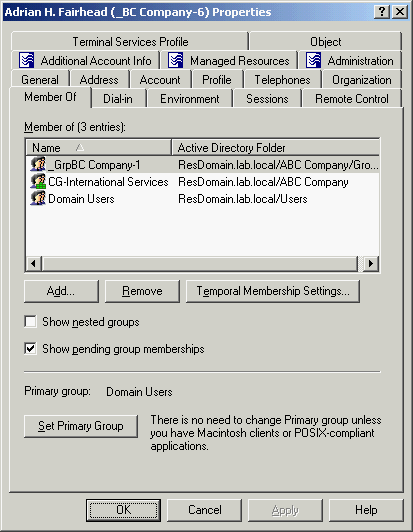To add user accounts to groups, select the accounts, right-click the selection, and click Add to a group. This displays the Select Objects dialog box where you can select the groups to which you want to add the accounts.
In the Select Objects dialog box, you can select groups from the list or type group names, separating them with semicolons. Use the Check Names button to verify the names you type. If Active Roles cannot find a group, it prompts you to correct the name.
You can also add a user account to groups by modifying the group membership list on the Member Of tab in the Properties dialog box. To display the Properties dialog box, right-click the user account and click Properties.
The Member Of tab lists the groups to which the account belongs, as shown in the following figure. If the Show nested groups check box is selected, the list also includes the groups to which the account belongs owing to group nesting.
The Temporal Membership Settings button can be used to specify the date and time when the user should be added or removed from the selected groups. For more information about this feature, see Using temporal group memberships later in this document.
Figure 9: Adding user accounts to groups

On the Member Of tab, you can manage groups directly from the list of groups. To manage a group, right-click it, and use commands on the shortcut menu.
You can add the user account to groups by clicking Add on the Member Of tab. This displays the Select Objects dialog box, allowing you to select the groups to which you want to add the user account.
|

|
NOTE:When you select multiple user accounts, the Member Of tab lists the groups to which all the selected accounts belong. If one of the accounts does not belong to a given group, that group does not appear in the list. |
To add a user account to a group
- In the console tree, locate and select the folder that contains the user account.
- In the details pane, right-click the user account, and then click Add to a Group.
- Use the Select Objects dialog box to locate and select the group to which you want to add the user account (you can select more than one group to add the account to).
|

|
NOTE:
- You can add multiple user accounts to a group at a time: Select the accounts, right-click the selection, and click Add to a Group. To select multiple accounts, press and hold down CTRL, and then click each account.
- You can also add or remove user accounts from groups by using the Properties dialog box: Select one or more accounts, right-click the selection, click Properties, and go to the Member Of tab in the Properties dialog box.
- You can use the Find function of Active Roles in order to locate the user accounts you want to add to a certain group. Once you have found the user accounts, you can proceed as follows: Select the accounts in the list of search results, right-click the selection, and click Add to a Group.
- By adding a user to a group, you can assign permissions to all of the user accounts in that group and filter Group Policy settings on all accounts in that group.
|
To remove a user account from groups, right-click the user account, click Properties, and go to the Member Of tab. On the Member Of tab, select groups from the list and click Remove.
To remove a user account from a group
- In the console tree, locate and select the folder that contains the user account.
- In the details pane, right-click the user account, and then click Properties.
- On the Member Of tab in the Properties dialog box, clear the Show nested groups check box, select the group from which you want to remove the user account, and click Remove.
|

|
NOTE:
- If you have not cleared the Show nested groups check box, the list on the Member Of tab also includes the groups to which the user account belongs indirectly, that is, because of group nesting. If you select such a group from the list, the Remove button is unavailable. A user account can be removed from only those groups of which the account is a direct member.
- The user account cannot be removed from its primary group (Domain Users by default). You first need to change the user’s primary group (see Steps for changing a user’s primary group later in this document).
|


